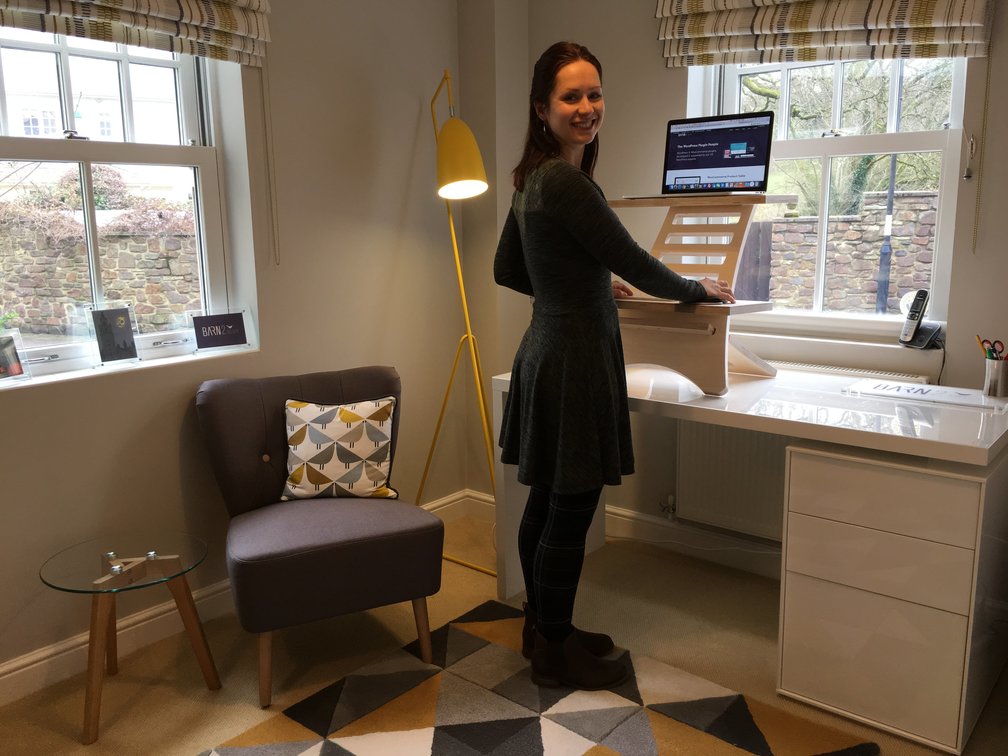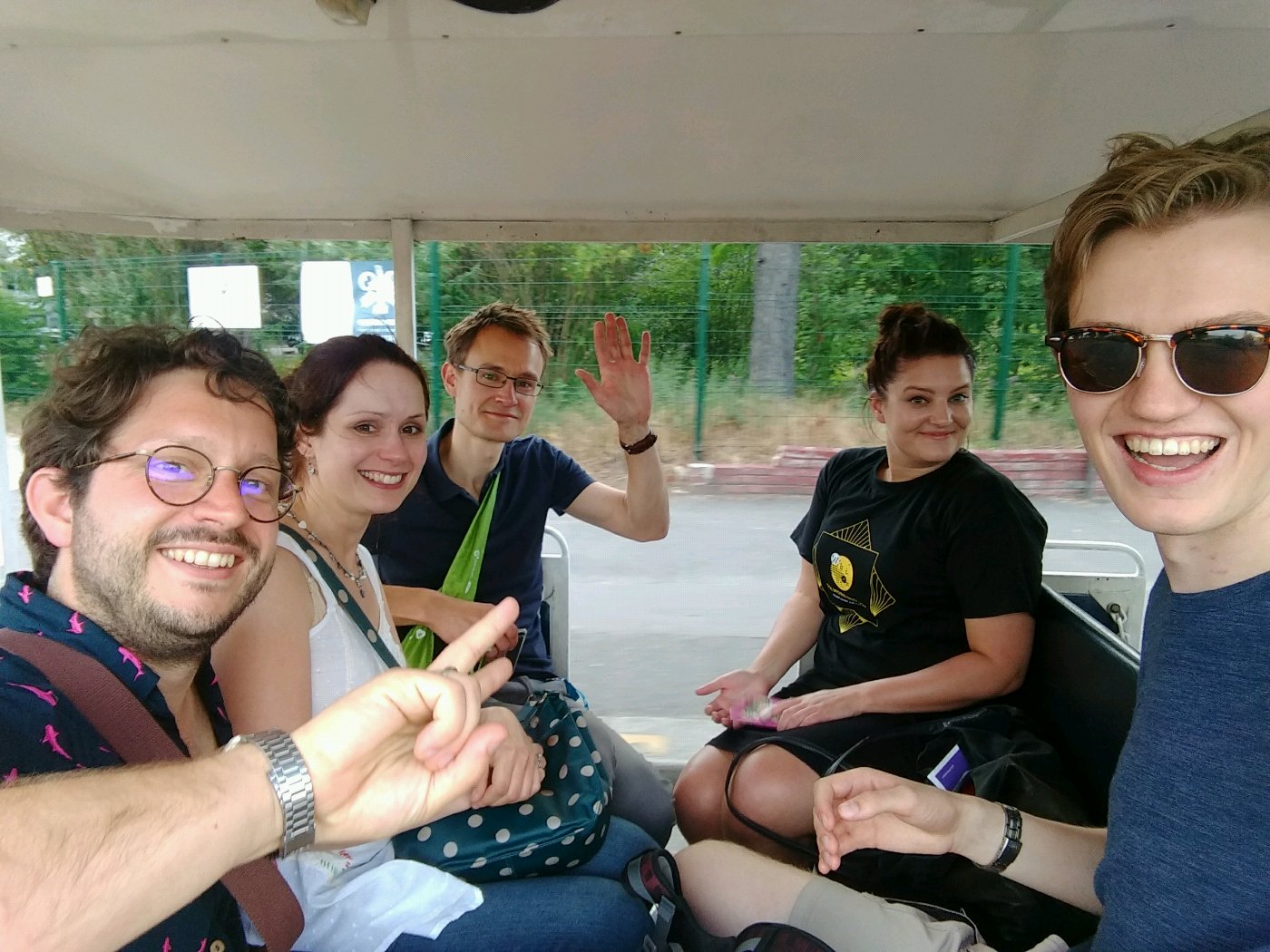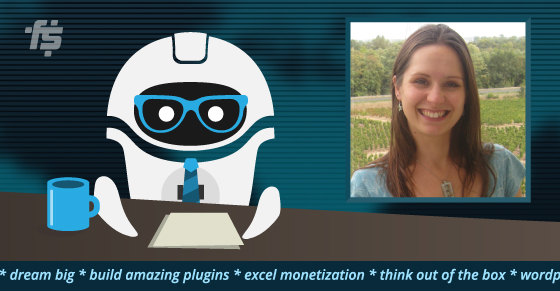Katie Keith and her husband Andy co-founded Barn2Media in late 2009. Initially dedicated to designing WordPress websites for clients, they envisioned building their business around selling products since early on. After a few failed attempts, in 2016, they managed to successfully shift their focus over to developing premium WordPress plugins. Their plugin business has been doing so well that, within a year, it was generating more income than their original client business. With such a remarkable journey behind her, Katie joins us to look back and share the lessons learned along the way.
Katie, thank you for agreeing to do this interview and share your story. Let’s start by getting to know you better. What can you tell us about your background?
I graduated in 2002 with a first class honours degree in Philosophy in English – nothing to do with computers or the web! I had no idea what I wanted to do for my career and tried several jobs until I found something I enjoyed.
All my jobs involved building websites in some way. My first job after graduation was writing Help pages for a software company, and I was responsible for the non-technical maintenance of websites for other companies I worked for. I was also responsible for marketing and public relations, which gave me a good range of skills that I use at Barn2 Media today.
All my WordPress knowledge is self-taught, and I’ve worked on 100’s of WordPress sites over the past 8 years. I’m not a coder (that’s Andy’s role!) and would describe myself as an advanced user of WordPress.
When you and your husband Andy started the website designing business back in 2009, what made you choose WordPress?

Throughout our 20’s, Andy and I talked endlessly about working for ourselves and starting a business together. His background is in software development and when we finally took the plunge and started the business in 2009, we decided on web design because it was a good way to combine our skills, had low barriers to entry, and was well suited to our lifestyle goals of working from home.
In designing our first website, we discovered WordPress as the best platform to use. Before long, we were building all our sites in WordPress.
In late 2010, it occurred to me while hiking on Dartmoor (the best way to come up with ideas!) that perhaps I should run some Google AdWords ads focussed on WordPress-related keywords. Previously, I had been advertising as a local web design company, without mentioning WordPress – even though all our sites were built in WordPress. I spent £75 on the new AdWords campaign, and this brought in over £3,000 of work almost immediately. Some of those clients are still with us today, so the true long-term figure from that campaign is now well over £15k. Not a bad return on investment!
Clearly, in 2010 there was a huge gap for WordPress specialists. This was a real springboard for the business and established us as one of the UK’s leading WordPress companies. We’ve never looked back and all our work has revolved around WordPress ever since.
How did you go from designing websites to developing WordPress plugins? What were the main challenges in making this shift?
Andy and I had always dreamed of selling WordPress products rather than designing websites for other people. Like many people, we were looking for a more scalable business model that could generate more income from the same amount of work.
The client-facing business was so successful that we always had far more work than we needed. This was a real distraction because it meant that we struggled to find time to prioritize product development.
We tried a few side-projects, but took far too long to get to market and weren’t successful. For example, we spent a year developing a multipurpose theme to sell on ThemeForest, but it was never launched because in that time, the theme market changed and big players like Avada took over the space. We had been left behind and couldn’t stay ahead of the game when we were focussed on client work too.
Learning from this mistake, we decided that WordPress plugins were a better opportunity than themes because they tend to be simpler to develop (if you choose relatively simple plugins), and simpler to support as they focus on a specific task. In early 2016, Andy stopped doing client work and committed totally to developing free and premium WordPress plugins. I continued with the client work but managed to dedicate about half my time to marketing the plugins. This gave us enough momentum to get several WordPress plugins to market fairly quickly.
We decided that WordPress plugins were a better opportunity than themes because they tend to be simpler to develop and simpler to support as they focus on a specific task
Fortunately, we started getting sales within a few days of launching our first plugin. This was because we had chosen a very niche area (our first paid plugin was WooCommerce Password Protected Categories) so it wasn’t too hard for people to find out about the plugin. We were lucky that such a huge number of people use WooCommerce, you can get lots of sales by focussing on a very specific niche.
Over the next few months, we listened to our clients and developed other WordPress plugins in response to their requests. For example, we created our dynamic WordPress table plugin – Posts Table Pro – after users of our free Posts Table with Search + Sort plugin asked to list custom post types and custom fields in a table. We then developed our WooCommerce Product Table plugin because lots of Posts Table Pro customers were asking for extra features for listing WooCommerce products. WooCommerce Product Table turned out to be incredibly successful and has had more sales than all our other WordPress plugins combined.
I’d definitely recommend creating WordPress plugins that meet a specific need that isn’t met elsewhere. So many people use WordPress that you can get plenty of sales even if your plugin is very specific. For 4 out of the 5 WordPress plugins we’ve developed, I’ve found that the market is far bigger than I expected!
How do you manage to provide support for your WordPress plugins on your own – without hiring support staff – and still keep a work-life balance?

When we started selling WordPress plugins, we were tempted to give up after a few months because each sale seemed to require quite a lot of support. When I worked out our hourly rate, it was worse than the client-facing side of the business!
Instead, we overcame this challenge by working really hard to reduce the need for people to contact us for support. This underpins all parts of the WordPress plugin business.
For example, we built a searchable knowledge base and structured our website to force people to search the knowledge base before they can request support. We’ve designed our plugin settings pages to make them more intuitive with contextual links to the documentation. I keep a Google Doc with answers to frequently asked questions, which saves me re-typing the same response more than once. I try to see each support request as an opportunity to stop anyone else from asking the same question.
We worked really hard to reduce the need for people to contact us for support as we see each support request as an opportunity to stop anyone else from asking the same question
With that in mind, I make changes to the knowledge base on a daily basis in response to support requests that could have been prevented. Between Andy and myself, we were spending a couple of hours a day on support when our revenue from plugins was a third of what it is now. We’ve managed to more than triple our WordPress plugin sales without spending more time on support.
You have been working with WordPress for many years, even before starting to sell plugins. How involved are you in your local WordPress community?
I’m more involved in the wider WordPress community than locally. The nearest WordPress-specific group is 2 hours’ drive away, and I prefer to network with WordPress professionals than the generic web design groups that are available locally.
I’ve attended two WordCamps, which were hugely valuable and an opportunity to make a connection with many WordPress professionals who I have stayed in touch with. I’m also an active member of several Facebook Groups relating to WooCommerce and Selling WordPress Products.
What valuable lessons have you learned from attending WordPress events and networking with fellow WP business owners?

I have learned a huge amount from networking with fellow WP business owners. I love the fact that everyone is dealing with the same issues and if you sell niche plugins, then you’re not in direct competition with each other.
For example, I met Chris from HeroThemes at WordCamp Europe 2017. It was great to meet the owner of a fellow UK-based WordPress plugins company. He shared some fantastic tips such as who they used for their plugin promo videos, and how they managed to reduce their plugin support time so that they could bring it back in-house. I have learned a lot from his overall attitude to plugin support.
When you shifted from designing WordPress websites to developing WordPress plugins, what adjustments did you have to make in your marketing strategy?
Shifting to plugin sales has completely transformed my marketing strategy. The client business was always successful with little or no marketing. We did Google AdWords between about 2010 and 2012, and after that our SEO was good enough that we never had to pay for advertising again. We always had more work than we needed!
Selling WordPress plugins is completely different because there’s no limit to the number of sales that you can have. As a result, I’ve been spending much longer on marketing than I used to.
It’s also changed the nature of the marketing that I do. For example, Google AdWords was very profitable for promoting our web design services because each sale brought in thousands of dollars in revenue. In contrast, each plugin sells for a relatively low amount, so it’s harder to get a return on investment. Instead, I’ve found that other types of advertising are more effective such as paid plugin reviews.
I do a lot of SEO work to ensure that we’re ranking for the keywords that potential plugin customers will be searching for. I’m also aware that I’m not a natural salesperson, and am working with Alex Denning to fill gaps in my skillset. For example, I am terrible at networking and Alex is helping me with this.
I’ve also learned a lot about upselling and cross-selling our plugins. For example, a lot of store owners combine some of our plugins to create a WooCommerce wholesale store. By writing about how to do this and sending information via MailChimp, I can tell existing customers about our other plugins and how they work alongside the plugin they’re already using. We now have quite a few customers who use more than one of our WordPress plugins.
In your experience, can an agency successfully sell both services and WP products or should the focus be just one of these?
A large agency can easily focus on both because they can dedicate different team members to each project.
A small agency needs to be more focused and decide how to prioritize. If there are just a couple of you, then you can’t build a client business and a product business at the same time. Each one will distract you from the other. The way it normally works is that client projects take up a lot of time and you want to keep the client happy, so your products will become sidelines and you’ll struggle to make them successful. The only way to prioritize WordPress products is to stop taking on new client projects, even if it means a short-term drop in income.
The only way to prioritize WordPress products is to stop taking on new client projects, even if it means a short-term drop in income
We’ve got the best of both worlds at the moment, which is great. We still host, support and maintain more than 70 websites that we previously developed for clients. These don’t take up much time because we have well-established processes and are familiar with the sites. This work provides a useful safety net and an additional income stream, without distracting us from the plugins.
We also still build affordable WordPress websites for clients under our MySimpleSite service. This is different from the larger projects that we used to do because each website is pre-built based on a template and only takes a few hours to set up. It’s another stream of ongoing revenue that doesn’t take up too much time.
So we still do quite a bit of client work, but only when it doesn’t compromise the products. We receive regular inquiries about bigger projects and always refer these to other WordPress agencies, as I know that we’re not in a position to take these on alongside the plugins.
You have been selling premium WordPress plugins and so far you’ve been quite successful. How do you keep the ongoing revenue sustainable?
To get sustainable income from selling WordPress plugins, you need regular sales supported by ongoing revenue. We achieve this by having several plugins and marketing them effectively, and also by having annual license key renewals for our plugins so that customers must pay every year to continue receiving support and updates.
I’d like to build on this by launching a few new plugins this year and continuing to improve our marketing. We also keep a feature request list and prioritize it so that we can keep improving our existing plugins in a way that will increase sales. Adding new features to existing plugins also helps to show our existing customers that it’s worth renewing their license key each year.
Adding new features to existing plugins also helps to show our existing customers that it’s worth renewing their license key each year.
What are your thoughts on adopting a subscription-based model?
I am 100% in favour of a subscription-based model. We introduced automatic annual subscription payments for all our plugins in October 2016. In October 2017, our plugin renewal rates significantly increased and we now make a couple of thousand dollars a month just from subscription payments. The renewal rate was almost zero when customers had to renew manually.
I recommend reading Freemius’ The WordPress Plugin Business Book, as the section on subscription models is fascinating. It encourages you to look beyond the obvious and think about the best pricing models for your own business, instead of just doing what everyone else does.
Grab a free copy of our Cheat Sheet for
Selling Plugins and Themes
A growth roadmap with concise, actionable tips for every milestone of WordPress product development.

It’s also worth reading about how ongoing subscriptions have transformed the profitability of Pippin Williamson’s plugins such as Easy Digital Downloads. This is inspirational and shows what a difference a subscription-based model can make.
However, I do believe that the subscription model is still in its infancy with WordPress plugins. A lot of customers remember when all plugins had a one-off fee, and resent having to pay more than once. I believe that plugin companies need to work together and stand up to this. If a customer is receiving ongoing support and updates for a plugin, then the plugin company has a right to receive ongoing income as a result. Let’s all stand firm together!
If a customer is receiving ongoing support and updates for a plugin, then the company has a right to receive ongoing revenue as a result
Overall, I think that an annual subscription offers the right balance at the moment. Customers are more likely to accept monthly subscription payments for SAAS products but aren’t ready to pay for WordPress plugins in this way. Some plugin companies are starting to introduce monthly payment options and I look forward to seeing this develop over the next couple of years. For now, I think that monthly payments are a bit too ambitious for most plugins.
Your orientation towards a specific niche allowed you to “dodge” the marketplaces, yet, you still managed to gain good traction. From your experience, what advice can you give to people who are trying to find a niche?
Selling niche plugins has been essential to the growth of our plugin business, as it made it easy to find a space for ourselves without any direct competition from bigger companies. And even better, it allowed us to sell our plugins directly on the Barn2 Media website without having to pay commission to a third party marketplace such as CodeCanyon.
If you’re already in the WordPress industry then it’s not too hard to find a niche of your own. Listen to your clients or customers. If you’ve ever struggled to find a suitable theme or plugin for your own website, or for a client’s website, then this could be an opportunity to develop a solution and sell it to other people! There are also forums and Facebook groups that you can use to find gaps in the market.
The important thing is to create something unique, as that’s the best way to avoid competition and make sure people can find your plugin. I’ve found that it’s best to only develop plugins that don’t already exist elsewhere. When you start looking for gaps, you’ll be surprised at how many there are! You just need to be deeply entrenched in the WordPress world so that you understand the market and notice these opportunities when you come across them.
If you could go back in time, knowing what you know now, what would you do differently in your business?
Selling products is what I’ve wanted for most of my 15-year career, and I kick myself for taking so long to get there. If I could go back in time, I would have quit my job and started a business sooner, and also made the switch from client projects to selling products sooner.
For the future, are you planning to build new plugins or would you rather focus on improving your existing ones?
Both!
Adding new features to existing plugins is really important because it’s easier, and each new feature can open up a whole new market and increase sales. We add new features in an evidence-based way, as our feature request list has a scoring system based on a combination of demand, difficulty, and impact on sales. This lets us focus our time on features that will make the plugin business more successful, while also making the greatest number of customers happy.
However, it’s really important to spread the risk and not put all your eggs in one basket. We intend to build several new WordPress plugins too. I don’t want to be the sort of company that has dozens of plugins because each plugin brings additional overhead in terms of support and maintenance, and we’re keen to keep it in-house and avoid having to employ staff. However, it’s been a year since we launched our last plugin as we’ve been focussing so much on the existing ones, and I’d like that to change in 2018. Watch this space!
Katie, I appreciate you taking the time to answer my questions and share your story with us. I am sure our readers can learn from the insights you have given. Before we wrap this up, what is the best way to reach out to you?
I will reply to any comments left below, and you can also reach me at [email protected] or via Twitter @barn2media.









Thanks interviewing me! I'm subscribing to this thread so that I can reply to any questions/comments.
Great interview. I came across your story before on indie hackers. It's awesome what you have achieved. We hope to launch some plugins ourselves in the future. Thanks for sharing
Great advice. We have aimed at the same thing for our plugins. Thanks for a very useful and inspirational interview.
Nice Post Thanks for Sharing...